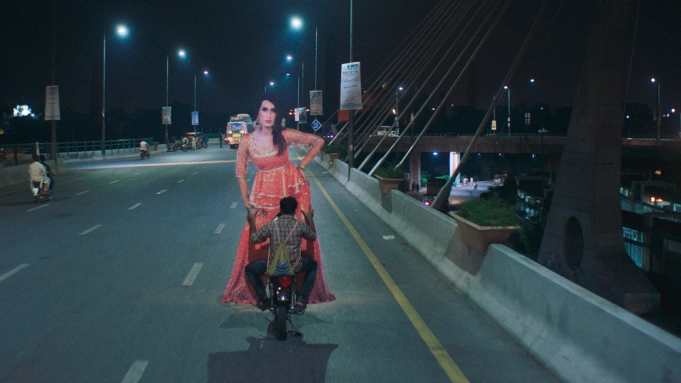
The past few years have seen an increase in queer-themed films coming out of Muslim countries. Hot on the heels of Morocco’s excellent Le Bleu Caftan – soon to be screened at a Saudi Arabian film festival – comes Joyland, the directorial debut from Pakistani filmmaker Saim Sadiq
With famous activist Malala Yousafzai as executive producer, and the Queer Palm and Un Certain Regard prizes from its 2022 Cannes Film Festival debut, Joyland promises to make an impact as Pakistan’s chosen entry for Best International Feature Film at next year’s Academy Awards Oscar’s ceremony.
We meet the extended middle-class Rana family who all live together in one house in a densely populated area of Lahore. Seventy-year-old controlling patriarch Abba ( Salmaan Peerzada) is wheelchair-bound and lives with his son and daughter-in-law Kaleem (Sohail Sameer) and Nucchi (Sarwat Gilani) and their four daughters as well as his other son Haider (Ali Junejo), and his wife Mumtaz (Rasti Farooq).
 Abba runs a very traditional, conservative household and yearns for one of his daughters-in-law to bear him a grandson. His son Haider has not worked for years and is supported by Mumtaz who works full-time as a make-up artist in a beauty salon. Mumtaz is a strong independent woman who wants to work whereas Haider is a slightly lost soul and happy to stay at home and help with his sister-in-law’s children. Then, one day a friend offers him a job as a backing dancer in an erotic dance cabaret fronted by Biba (Alina Khan), a formidable trans dancer. Haider accepts the job but keeps the exact nature of his work secret from his family.
Abba runs a very traditional, conservative household and yearns for one of his daughters-in-law to bear him a grandson. His son Haider has not worked for years and is supported by Mumtaz who works full-time as a make-up artist in a beauty salon. Mumtaz is a strong independent woman who wants to work whereas Haider is a slightly lost soul and happy to stay at home and help with his sister-in-law’s children. Then, one day a friend offers him a job as a backing dancer in an erotic dance cabaret fronted by Biba (Alina Khan), a formidable trans dancer. Haider accepts the job but keeps the exact nature of his work secret from his family.
Initially a terrible dancer, Haider slowly improves under the watchful eye of Biba, who is a powerful force of nature. The two spend much time together and slowly develop romantic feelings for each other. Meanwhile, as Haider is now spending a lot of time rehearsing for his show, Mumtaz is forced by Abba to give up her beloved work and stay at home to help look after her sister-in-law’s children. She really resents this and dreams of escaping and a better life, sharing her dreams with Nucchi. Abba himself has a secret lady friend and a developing relationship.
Sadiq’s film is an intense analysis of the crippling effect ‘traditional family values’ on gender and sexuality can have on individuals in 21st Century families, not just in Pakistan, but in conservative households across the world. Many of the family members in this structure are slightly lost and downtrodden, and contrast sharply to the assertive, driven, fearless Biba who has no such strictures around herself.
Pakistan, in common with many other Asian countries, has long recognized the concept of a ‘third gender’ and has a vibrant trans culture protected by law. Life is usually tough for the trans community, though, many of whom can only find work as sex workers. Homosexuality remains frowned upon in Pakistani society, although more and more middle-class and rich queers there are coming out to friends and families and there are underground queer parties. Pakistan ranks 4th in the world for per capita viewers of gay porn, so there is definitely a lot of queer interest in the country. Haider’s queer character having a starring role is a groundbreaking moment in a Pakistani film, and will hopefully help increase visibility and acceptance for the community.
Shot on location in busy, iconic Lahore, Sadiq’s film combines atmospheric cinematography with great casting and powerful messaging. His characters are complex and highly developed and there is an authenticity to both the script and the visuals. More than just a film. Highly recommended.
Queerguru’s Contributing Editor Ris Fatah is a successful fashion/luxury business consultant (when he can be bothered) who divides and wastes his time between London and Ibiza. He is a lover of all things queer, feminist, and human rights in general. @ris.fatah
